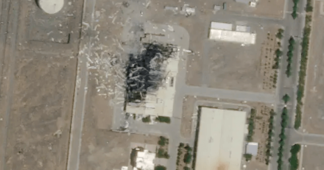Israeli media reports that the entity is facing a difficult dilemma because there is no “responsible” official to make the right decisions.
Apr. 15, 2024
A source very familiar with the marathon meetings that took place this week in a series of secret discussion rooms, above and below ground, was cited by Ronen Bergman on Ynet as saying that “if they had filmed it and broadcast it on YouTube, today there would be four million people in Israel trying to find a way to escape from here.”
According to the report published on Sunday following Iran’s military operation, the occupation today is facing a dilemma regarding how to respond to the attack and is struggling across different internal issues, but it has been lacking a “responsible adult since October 7” to address all the problems.
The writer suggests that Netanyahu should follow in the steps of Britain’s late Prime Minister Winston Churchill during WW2, and act “responsibly, with discretion, be vocal, be mature.” But like other cabinet members, “the more [Netanyahu] tries” to be like Churchill, the more he drifts away from being so.
“The war drums emerging from the cabinet room reveal a lack of knowledge of what Churchill proved during the [most] threatening [periods] of the war,” the writer said, emphasizing that “restraint is not defeat. Patience is not surrender. Patience is not a sign of weakness.”
‘First time’
On Sunday, the Iranian response to the Israeli assassination of the senior IRGC general in Damascus was launched, “and if Israel responds, it will respond to strategic targets in the heart of Tehran and perhaps in other cities. It’s binary – zero or one,” he said.
“The war cabinet, and not only Netanyahu and [Yoav] Gallant, believed [on Sunday] that if the attack is from Iranian territory, Israel must respond because, since as one of the sources says: ‘It is impossible for Israel to attack a target in Syria, and Iran to respond by attacking Israel from within Iranian territory to Israeli, while Israel refrains'” from responding to that attack.
Initially, the war cabinet approved attack plans that were supposed to be carried out within a few hours of Iran’s operation, according to the writer. “The cabinet wanted an immediate response last night, without hesitation and without waiting.” Meanwhile, Iran suspended flights over its territory anticipating an Israeli attack.
“There is a symbolic value to the very attack” as it is “the first time that Israel has been attacked by a sovereign country since the Gulf War in 1991,” the piece said about former Iraqi President Saddam Hussein’s missile strikes on the entity.
“But then as well as now – there is also a reason to take a deep breath, drink water, if necessary, and stop for a moment.”
Bergman recalled the United States’ reaction to the attack on “Israel” in 1991, when it “requested” that the Israelis not respond, fearing that it would “breakup” Washington’s international image. He also mentioned that “Israel” then received compensation from both the US and Germany for the “minimal damage” caused by Saddam’s missiles.
“Until two days ago there was a jarring difference between the two times – then the United States “asked Israel to sit quietly and that it .. would take care of the missile launchers,” but this time, “the United States simply asked Israel to sit quietly. And of course, this causes additional difficulties.”
Avoiding war with Iran
The United States “did not understand until the last two days the severity of the situation and Israel’s unwillingness to contain an Iranian attack from Iranian soil on Israeli territory,” he pointed out.
According to reports, “Israel did not coordinate the assassination operation in Damascus with the United States,” he mentioned, and the Israeli military informed the US about the aggression “only at the moment the bombs” struck the consulate. “This news reportedly angered the Americans.”
Washington is “very worried” and “feels like Israel” has led it into the situation they were proactively trying to avoid – a direct confrontation with Iran.
“On the one hand, they [US] don’t want to get involved in a war with Iran,” and on the other hand, the United States received clear signals “that made it fear that an unequivocal [reaction] on Israel’s side will also be interpreted negatively in other countries such as Jordan, Saudi Arabia, and the United Arab Emirates.”
According to the writer, “the good news, [which further] emphasizes how much Israel needs to behave with moderation and responsibility, is that the US has initiated significant diplomatic activity in recent days” with clear signs that they are working.
“A lot of blunt diplomacy and bilateral calls to Iran’s foreign minister from [his] counterparts in Germany, Britain, France, Saudi Arabia and Turkey, to convince them to reduce the activity,” resulted in Iran’s decision to “reduce the scale of its attack, and move the targets of the attack to areas far from the center [“Gush Dan].”
Finally, he criticized Israeli authorities for addressing the internal front and its “attitude toward the public“.
He said that “Home Front Command instructions [for the public] are unreasonable,” pointing out to suspending schools, and the lack of work – asking: “Is it allowed to go outside?”
“Who in the country is making the decisions regarding the public and how much pressure is put on it? Who approves it? In my understanding – no one.”
We remind our readers that publication of articles on our site does not mean that we agree with what is written. Our policy is to publish anything which we consider of interest, so as to assist our readers in forming their opinions. Sometimes we even publish articles with which we totally disagree, since we believe it is important for our readers to be informed on as wide a spectrum of views as possible.











